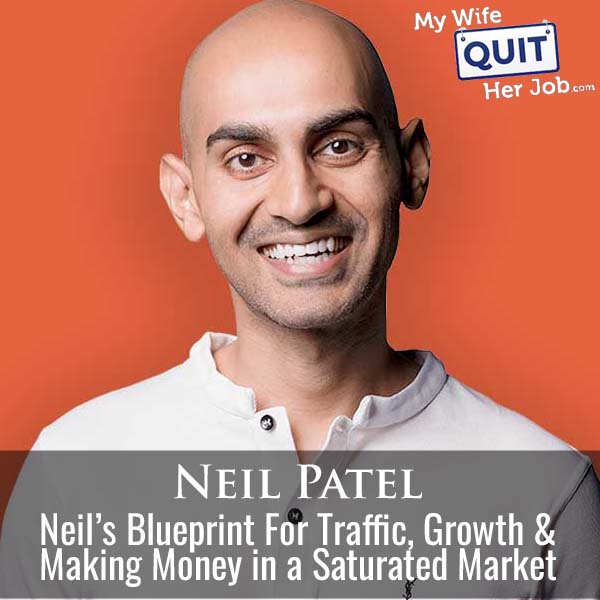601: Neil Patel’s Blueprint For Traffic, Growth & Making Money in a Saturated Market

```html Neil Patel Unveils Blueprint for E-commerce Traffic and Growth in AI-Driven Market
In a saturated online marketplace increasingly shaped by artificial intelligence, e-commerce businesses face unprecedented challenges in attracting traffic and driving sales. Digital marketing expert Neil Patel, co-founder of Crazy Egg, Hello Bar, and UberSuggest, recently shared his insights on navigating this complex landscape in an interview on the "My Wife Quit Her Job" podcast with Steve Chou. Patel outlined strategies for standing out, generating consistent traffic, and converting that traffic into revenue in the age of AI.
The Evolving Landscape of Search
Patel emphasized that the nature of online search is fundamentally shifting, moving from traditional search engine results pages (SERPs) to AI-powered interfaces. He noted that while AI overviews were initially consistently placed at the top of Google search results, they now appear in that prime position only around 88% of the time. This change reflects Google's ongoing experimentation with how AI integrates into the search experience.
He posited that the future of search will likely involve a hybrid approach, with search engines intelligently determining whether to present information in a traditional format or through a more conversational, AI-driven interface, depending on the nature of the query. "The homepage of Google is really clean... They are smart enough to detect what your intent is and then show you the interface that maps up with that. And I think that’s what we’re going to see in search," Patel stated.
Content Creation for Humans and AI
According to Patel, content creation must also adapt to this new reality. He described a three-stage evolution of online content strategy:
Past: Writing content primarily for search engine robots, focusing on keyword stuffing. Present: Creating content for human readers, emphasizing user experience and high-quality information. Future: Crafting content for humans but packaging it in a way that is easily digestible for AI models.
Patel used the example of an online dog food retailer like Chewy. Instead of simply writing general blog posts about dog food, they should focus on creating detailed articles addressing specific questions and needs, such as "The 10 Best Organic Dog Foods for Puppies" or "How to Transition Your Aging Dog to a Senior Diet." This approach allows AI tools to extract relevant information and recommend the retailer's products to users conducting research.
Expert Analysis: The Rise of Semantic SEO
Dr. Emily Carter, a professor of digital marketing at the University of California, Berkeley, echoed Patel's sentiments, emphasizing the importance of "semantic SEO." "Traditional SEO focused on keywords, but semantic SEO focuses on the meaning and intent behind search queries," Carter explained. "By understanding the questions people are asking, businesses can create content that directly answers those questions and establishes themselves as authorities in their niche. Patel's advice is spot-on; it's about anticipating user needs and providing comprehensive, AI-friendly solutions."
Standing Out in a Saturated Market
Patel emphasized that relying solely on traditional marketing tactics is no longer sufficient. Businesses need to leverage data to understand their target audience deeply and create highly personalized experiences. This includes:
Identifying the specific questions and pain points of potential customers. Creating content that directly addresses those questions and provides valuable solutions. Optimizing content for both human readability and AI digestibility. Leveraging AI tools to analyze customer data and personalize marketing messages.
The Agency vs. SaaS Debate: A Hybrid Approach
Patel also addressed his decision to focus on MP Digital, a marketing agency, despite his extensive experience with Software-as-a-Service (SaaS) companies. He explained that while SaaS businesses often attract significant investment, service-based businesses can generate more revenue. Patel's approach with MP Digital is to combine the best of both worlds, offering agency services alongside proprietary tools like UberSuggest and AnswerThePublic. He believes this hybrid model allows for greater efficiency and customer satisfaction.
Historical Context: The Evolution of Online Marketing
Patel's career reflects the evolution of online marketing over the past two decades. He gained prominence in the early 2000s with his blog, Quick Sprout, at a time when SEO was largely focused on keyword optimization. As search algorithms became more sophisticated, Patel adapted his strategies, emphasizing user experience and content quality. His current focus on AI-driven marketing reflects the latest shift in the industry, as businesses grapple with the implications of large language models and generative AI.
The Bottom Line
In an increasingly competitive and AI-driven e-commerce landscape, businesses must adapt their marketing strategies to stay ahead. Neil Patel's blueprint emphasizes the importance of understanding the evolving nature of search, creating content for both humans and AI, and leveraging data to personalize customer experiences. By embracing these strategies, e-commerce businesses can navigate the challenges of the modern marketplace and achieve sustainable growth. ```
Originally sourced from: WifeQuitHer Job
